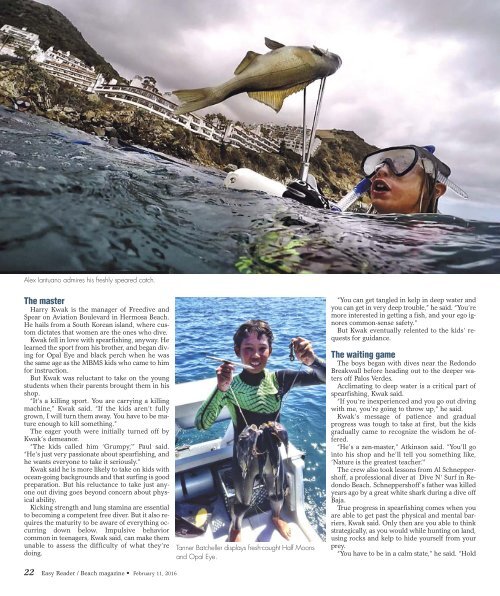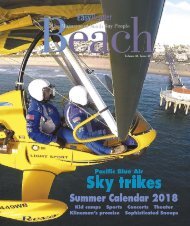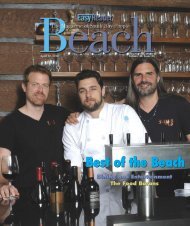Beach Feb 2016
You also want an ePaper? Increase the reach of your titles
YUMPU automatically turns print PDFs into web optimized ePapers that Google loves.
Alex Iantuano admires his freshly speared catch.<br />
your breath, slow down your heartbeat. When you are calm, then you can<br />
start hunting.”<br />
The boys’ weapon of choice is a tension-loaded speargun, which relies<br />
on rubber tubing to fire a spear, with a line for retrieval. It resembles a<br />
crossbow and requires a lot of force to prepare.<br />
“Loading these things is not easy, even for me,” Paul said.<br />
The kids began diving in their surf wetsuits. That Kwak said, is a common<br />
mistake.<br />
“It’s not good enough,” Kwak said, noting that surf wetsuits are not designed<br />
for prolonged submersion and that water can easily seep into them.<br />
“If you lose 10 percent of your body heat, that’s serious hypothermia.”<br />
Taste of something new<br />
As the boys got better at spearfishing, they began to learn more about the<br />
underwater world they encountered.<br />
“I honestly didn’t know anything when I started,” Snyder said. “There<br />
are different kinds of fish, different kinds of seaweed, different kinds of<br />
conditions to think about.”<br />
Diving has also made the kids more aware of environmental issues. Trash<br />
and debris in the ocean become especially grating, they say, when encountered<br />
while coming up for air. And following the encounter with the game<br />
warden, the kids are starting to see the wisdom in regulations governing<br />
catch-sizes.<br />
“Under 10 inches, you’re going to want to let it go,” Roskin said. “It’s not<br />
worth shooting those. You can barely get any meat off of them.”<br />
As their skills developed, each plunge became less of a struggle and they<br />
became more selective in their kills. They can identify a wide range of fish<br />
on sight and know which ones taste best.<br />
“At first, you want to catch anything that moves,” said Stavropoulous. “But<br />
eventually, you narrow it down to the fish you like to eat.”<br />
The crew’s catches have included white sea bass, ling cod and wahoo.<br />
They have gotten to the point where not just taste, but the difficulty in capturing<br />
a fish motivates their hunt.<br />
Some fish, like calico, are known for their craftiness. Others not so much.<br />
“Rockfish are good eating, but they’re kind of stupid,” Batcheller said.<br />
In a rare moment of agreement for middle-schoolers, all thought yellowtail<br />
represented the pinnacle.<br />
“We’ve got a little card from Dive N’ Surf with all different kinds of fish,”<br />
Atkinson said. “Yellowtail, that’s the Holy Grail.”<br />
A lifestyle not a sport<br />
Getting involved in spearfishing has been relatively frictionless for the<br />
crew of friends. They don’t even need to apply for a state fishing license<br />
until they turn 16. And it has begun to shape the part of their lives without<br />
a spear in hand.<br />
During school, the kids will hold their breath and look at the classroom<br />
clock, seeing how long they can last.<br />
“You get better at holding your breath,” Roskin said. “And it helps with<br />
surfing, because you get more comfortable with holddowns.”<br />
Hawaii, Mexico and exotic coral reefs beckon. There is also the challenge<br />
of spearing fish that have eluded them so far.<br />
“I shot at a pack of barracudas once,” Batcheller said. “I barely missed,<br />
but they’re hard to hit.”<br />
Spearfishing and freediving have become more popular in the South Bay<br />
in recent years, Kwak said. Although the Internet has made equipment<br />
widely available, people still come by his store for advice that can only<br />
come from a lifetime of dedication.<br />
Kwak thinks of spearfishing as more of a lifestyle than a sport. He has<br />
arranged his life in such a way that he can frequently close up shop and<br />
head out to Palos Verdes to dive.<br />
“It’s a very small community,” he said. “It might be growing, but it’s still<br />
not a very good business.”<br />
In that sense, Kwak may have taught the kids more than he realized. The<br />
true draw of spearfishing, both said, is the sense of escape from the ordinary.<br />
“You don’t have to worry about school or anything,” Snyder said. “It’s just<br />
being in a different environment, a different world.” B<br />
The master<br />
Harry Kwak is the manager of Freedive and<br />
Spear on Aviation Boulevard in Hermosa <strong>Beach</strong>.<br />
He hails from a South Korean island, where custom<br />
dictates that women are the ones who dive.<br />
Kwak fell in love with spearfishing, anyway. He<br />
learned the sport from his brother, and began diving<br />
for Opal Eye and black perch when he was<br />
the same age as the MBMS kids who came to him<br />
for instruction.<br />
But Kwak was reluctant to take on the young<br />
students when their parents brought them in his<br />
shop.<br />
“It’s a killing sport. You are carrying a killing<br />
machine,” Kwak said. “If the kids aren’t fully<br />
grown, I will turn them away. You have to be mature<br />
enough to kill something.”<br />
The eager youth were initially turned off by<br />
Kwak’s demeanor.<br />
“The kids called him ‘Grumpy,’” Paul said.<br />
“He’s just very passionate about spearfishing, and<br />
he wants everyone to take it seriously.”<br />
Kwak said he is more likely to take on kids with<br />
ocean-going backgrounds and that surfing is good<br />
preparation. But his reluctance to take just anyone<br />
out diving goes beyond concern about physical<br />
ability.<br />
Kicking strength and lung stamina are essential<br />
to becoming a competent free diver. But it also requires<br />
the maturity to be aware of everything occurring<br />
down below. Impulsive behavior<br />
common in teenagers, Kwak said, can make them<br />
unable to assess the difficulty of what they’re<br />
doing.<br />
Tanner Batcheller displays fresh-caught Half Moons<br />
and Opal Eye.<br />
“You can get tangled in kelp in deep water and<br />
you can get in very deep trouble,” he said. “You’re<br />
more interested in getting a fish, and your ego ignores<br />
common-sense safety.”<br />
But Kwak eventually relented to the kids’ requests<br />
for guidance.<br />
The waiting game<br />
The boys began with dives near the Redondo<br />
Breakwall before heading out to the deeper waters<br />
off Palos Verdes.<br />
Acclimating to deep water is a critical part of<br />
spearfishing, Kwak said.<br />
“If you’re inexperienced and you go out diving<br />
with me, you’re going to throw up,” he said.<br />
Kwak’s message of patience and gradual<br />
progress was tough to take at first, but the kids<br />
gradually came to recognize the wisdom he offered.<br />
“He’s a zen-master,” Atkinson said. “You’ll go<br />
into his shop and he’ll tell you something like,<br />
‘Nature is the greatest teacher.’”<br />
The crew also took lessons from Al Schneppershoff,<br />
a professional diver at Dive N’ Surf in Redondo<br />
<strong>Beach</strong>. Schneppershoff’s father was killed<br />
years ago by a great white shark during a dive off<br />
Baja.<br />
True progress in spearfishing comes when you<br />
are able to get past the physical and mental barriers,<br />
Kwak said. Only then are you able to think<br />
strategically, as you would while hunting on land,<br />
using rocks and kelp to hide yourself from your<br />
prey.<br />
“You have to be in a calm state,” he said. “Hold<br />
The crew emerges from the deep onto the Bear Flag, owned by Jamie Meistrell of Dive N’ Surf.<br />
22 Easy Reader / <strong>Beach</strong> magazine • <strong>Feb</strong>ruary 11, <strong>2016</strong>

















